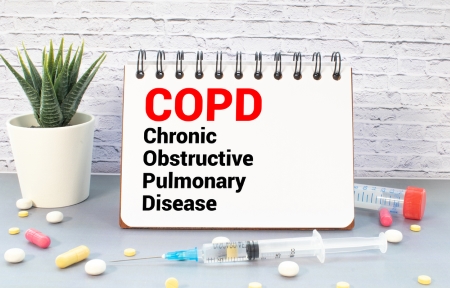Therapies, treatments, and good Habits for COPD are the FLASS special topics as we begin September. We quickly realized that this giant subject would need more than one blog.
Thus, our previous blog focused only on the symptoms and causes of COPD. And, this one will open the topic of treatments, specifically medications. Additionally, our next blog will further investigate treatments, therapies, and good habits involved in living with COPD—and extending your quality of life.
FLASS offers you a myriad of options if you learn you have COPD. At FLASS, doctors and staff specialize in giving you professional advice and compassionate care. FLASS will help you find options so you can live your best life in spite of your COPD diagnosis. Likewise, we always include the patients on their own health team. This inclusion makes you a proactive participant in your therapies, treatments and good habits for COPD control.
A Bit of FLASS Philosophy: Therapies, Treatments and Good Habits

If You Are Diagnosed With COPD, You Have Multiple Options For Pharmacuetical Therapies.
We will help you to realize this disease will influence your schedule, your physical, mental, social, and psychological well-being, every day of your life. Living with COPD is a big order, but we are here to help you choose your best options. Although we cannot cure COPD, we can help you select life options so you can manage your symptoms and even slow the progress of the disease.
Your Menu of COPD Options
As the experts agree, there are four pathways by which you can control your COPD.
1. Pathway to Living With COPD: Number One
Your doctor or caregiver will prescribe medication. However, you will need to discipline yourself to take your medication on the prescribed schedule and in prescribed amounts.
2. The Second Pathway to Living With COPD: Therapies
Your care team might suggest therapy such as exercise or inhalation therapy. Moreover, you will need to change your schedule to accommodate time for your health.
3. Your Third Pathway to Living With COPD: Surgery
You might need surgery at some stage of this disease. Therefore, we suggest that the more you know about the disease and the operation, the better you will feel about this option. Do your homework and ask your doctor questions about the surgery, because a little research never hurts anybody.
4. Pathway Number Four: Healthy Lifestyle Changes
It might be difficult to change habits to help your body fight this disease. However, we will support your efforts. For example, if you must stop smoking, start a healthy diet, get more rest, or begin regular exercise, we can help you. There will be more information about those options in our next blog article.
The Goals of Your Therapies, Treatments and Good Habits

COPD Diagnosis: Your First Duty is to Understand the Action Plan and Medications Schedule.
All of the treatments on these four pathways can make you feel physically and mentally better. Likewise, your options can give you a more active life. At FLASS, we strive to prevent or treat the complications inherent in COPD.
Medications Are Primary in Your Therapies, Treatments and Good Habits.
Let’s take a moment to review the kind of medications we use to treat COPD. You will find a list below. During the course of your disease, your physician might prescribe one or more of these common prescriptions.
Bronchodilators: A Mainstay of Your Medication Therapy
Bronchodilators usually come in an inhaler or nebulized form. “Inhaling the medication delivers it directly to your lungs and airways. These medications help to open constricted (narrowed) airways so you can breathe easier.” There are two special types of Bronchodilators. Doctors prescribe both β-agonists and anticholinergics.
In the first place, “β-agonists bind directly to beta receptors on smooth muscle cells to mediate their bronchodilator effect.” Typically, β-agonists may are short-acting. You might take albuterol or the longer-acting salmeterol.
So, What’s the Difference Between the Two Types of Bronchodialators?
It’s easy to think of the short-acting β-agonists as “rescue medications.” They can instantly help you breathe during a COPD flare-up. On the other hand, remember that you will need to take long-acting β-agonists twice daily. We refer to them as maintenance therapy.
More Options for Therapies, Treatments and Good Habits
You might have a different type of inhaler known as anticholinergic medication, like Atrovent. Use this versatile inhaler as either short-acting or long-acting. You can schedule it every 4 to 6 hours or, more simply, take it once a day.
This bronchodilator works by “blocking the chemical acetylcholine, which causes the airways to constrict.” Additionally, research indicates anticholinergics might decrease mucus.
A Very Special Pharmaceutical Therapy: Corticosteroids

COPD Cannot Be Cured. However, It Can Be Managed With Therapies, Treatments, and Good Habits.
“Corticosteroids, such as prednisone, reduce irritation and swelling in the airway.” These medicines are especially successful as treatment for exposure to an irritant. When your doctor diagnoses you with COPD, you will learn to avoid irritants in your lifestyle.
1. Beware of secondhand smoke.
2. Always avoid extreme temperatures.
3. Do not expose yourself to harsh fumes.
It’s Not Always About Inhalers!
Your physician can deliver Corticosteroids by a number of different methods.
- You can use an inhaler.
- Your doctor might prescribe a nebulizer.
- Patients can also take Corticosteroids orally in tablets.
- Sometimes you might need to take such medication through an injection.
- Corticosteroids: Not Always a Popular Option
We might as well tell you that corticosteroids are notorious due to their objectionable side effects.
The tablets can cause weight gain, water retention, and elevated blood sugar levels.
- Remember that long term corticosteroids can cause bones to weaken. Additionally, remember they can actually “depress the immune system.”
Inhalers behave differently. With inhalers, you risk a smaller chance of igniting side effects. You can actually use them for maintenance. Additionally, please view OUR BLOG ON EXACERBATION
Useful Treatment When Needed: Antibiotics
Among the many pitfalls for patients with COPD, respiratory infections stand out scarily. You see, “respiratory infections can make the symptoms of COPD worse.” Respiratory infections worsen your usual symptoms.
In this case, antibiotic prescriptions will be your heroes. However, remember that antibiotics cannot kill viruses. Typically, your doctor will assess your type of infection and then select the best prescription for it.
Anti-Smoking Medications: Your Healthy Choice
For smokers whose doctors diagnose them with COPD, we have options to break the habit. First of all, do not feel punished or guilty. Secondly, quitting smoking would improve your health, even without the diagnosis of COPD. We realize that nicotine is one of the most addictive substances on the planet. Thus, we can help you quit with nicotine replacement therapy.
Put simply, this regimen makes it easier to quit with decreasing dosages. Additionally, we have gum you can chew. Or, you might prefer a skin delivery system, through patches. Cessation therapy eases your COPD symptoms in a by completely delivering a diminishing dose of nicotine, and yet bypassing your respiratory system.
A Big Helper for Smoking Cessation
You might already know that there are certain antidepressants your doctor can prescribe. In fact, they can make you completely or partially forget about the cravings. As with any medication, be aware of the possible side effects that might accompany a smoking cessation drug.
Beyond Lungs: Anxiolytics
COPD can cause problems beyond the respiratory system. There is a vicious cycle that goes like this:
1. COPD gets progressively worse and breathing becomes more difficult.
2. The mental and emotional pressure can result in anxiety.
3. For your emotional well-being and quality of life, it is important to treat anxiety symptoms brought on by incessant breathlessness.
Medicines that Can Help You With COPD Anxiety
Thus, your FLASS COPD action plan for treatment, therapy, and good habits might eventually include anti-anxiety medication. Anxiolytics, as these drugs permit you to breathe with less difficulty. You will feel better about your breathing—And your life. Coping With COPD 2023
Possibilities of Opioids: The Reluctant Prescription

You Can Control Many of COPD Symptoms… By Learning More About Your Medicine and Action Plan.
To ease “air hunger” pain, some doctors might prescribe opioids or pain relievers. These narcotics are extremely addictive and are thus used in severe cases or to ease the end of life.
Such medicines are typically part of palliative care or hospice therapies. See more information at this online resource.
These medications in moderation, often administered in low dose form, can lessen the most distressing symptoms. Likewise, they have the ability to slow down the disease. Overall, when physicians cautiously monitor these drugs, studies have shown they can improve a COPD patient’s endurance and quality of life.
Watch for More About Therapies, Treatments and Good Habits for COPD
In Part 3 of our investigation of therapies, treatments, and good habits for COPD, you will find out more about treatments and lifestyle habits available to COPD patients. We add that if you or someone you love has COPD, then can find a wealth of information at this commendable online resource.
Just as we focused this blog on the medications used for COPD therapy, our next blog will focus on other treatments and lifestyle habits that help patients live well in spite of this disease.
We thank you for reading the FLASS blog and we leave you with a thought-provoking quote from an unknown author. COP“D is not a death sentence; it’s a life sentence. It’s a constant battle but one that is worth fighting.”
We can only add that the doctors and staff of FLASS are here to help you win that fight with every precious breath.

